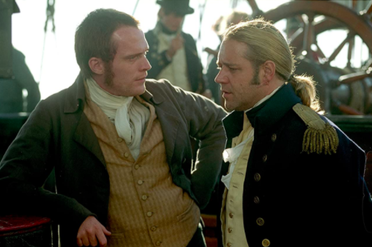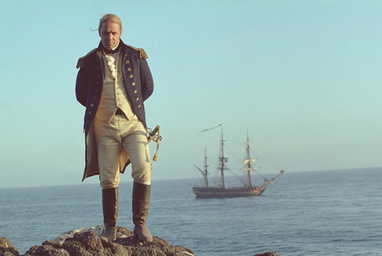
https://www.pluggedin.com/movie-reviews/masterandcommanderthefarsideoftheworld/
Twitter is… an interesting place to say the least. It’s a world-renowned platform known for hosting spirited online discourse, the occasional “Why would you say something so controversial yet so brave?” comments, and its own fair share of throwdowns between celebrities and their peers, or sometimes with the general public too. Most recently, Russel Crowe - Maximus Decimus Meridius himself – responded to a member of the public who claimed that Crowe’s sea naval epic, Master and Commander, was rather sleep-inducing. Naturally, he wasn’t having any of it:
“That’s the problem with kids these days. No focus. Peter Weir’s film is brilliant. An exacting, detail oriented, epic tale of fidelity to Empire & service, regardless of the cost. Incredible cinematography by Russell Boyd & a majestic soundtrack. Definitely an adult’s movie.”
Now, one might understandably find fault with Crowe’s response which leads with a cheeky jibe. But nevertheless, his re-appraisal is, in my mind, spot-on. Weir’s film is a completely immersive experience which welcomes you into the crew of the Royal Navy’s HMS Surprise, captained by Jack Aubrey (Crowe), and never once docks for port. It is also, as Crowe indicated, a “tale of fidelity to (the) Empire & service, regardless of the cost” – a constantly fascinating motif, which prompted me to dwell upon what it means to pledge true fealty to someone or something, and at what cost. Before long though, such ruminations and promptings from the Lord led me to see comparisons with biblical teaching and reflect upon the question of who I show complete fealty to in my life, and why.
In His word, the Bible, God desires that those who seek to be in relationship with Him should express loyalty as noted in the words of Jesus, commonly known as ‘The Great Commandment’: “…love the Lord your God with all your heart, and with all your soul, and with all your mind, and with all your strength.’ The second is this, ‘You shall love your neighbour as yourself.’ There is no other commandment greater than these.” (Mark 12:29-31, NRSV). However, such loyalty is to be expressed from a place love. For God, in His relationship with those who love Him, has shown steadfast loyalty which will always come from a place of love:“…neither death, nor life…nor anything else in all creation, will be able to separate us from the love of God in Christ Jesus our Lord.” (Romans 8:38-39, NRSV). God, in His great love and mercy, promises His loyalty and commitment to all who dedicate themselves to Him, but also offer their hope and trust too. But throughout our lives, who might we have pledged our loyalty to, or where might it currently be misplaced?
The Bible teaches that humanity, by and large, has pledged its loyalty to selfish, sinful pursuits which are ultimately, in the grand scheme of life, just as unimportant, harmful and foolish as Captain Aubrey’s pursuit of the Acheron. Why? In having chosen to direct our devotion towards the world and away from God, we become distracted and unaware of the relationship God wishes to have with us, His creation. In Him, we find a “…fortress where I will not be shaken” (Psalm 62:8, NLT), “peace with God through our Lord Jesus Christ” (Romans 5:1, NIV) and so much more. However, leading a life of sin – committing wrongful doings in the eyes of God – leaves us devoid of such blessings. And nobody is innocent, for the Bible tells us that “everyone has sinned; we all fall short of God’s glorious standard” (Romans 3:23, NLT). Instead of pursuing a life of devoted relationship to the Lord, humanity chooses devotion to the devil, who keeps enslaved all who do wrong in the eyes of God: “Jesus replied, “I tell you the truth, everyone who sins is a slave of sin.” (John 8:34, NLT).
As a result of living such a lifestyle, we invite darkness into our lives (which hurts ourselves/others) and rebel against God – for which the consequences are eternal. If we don’t seek forgiveness for our mistakes, and choose to no longer dedicate our lives to sin, we will spend eternity suffering the consequences for it: “And they will go away into eternal punishment, but the righteous will go into eternal life.” (Matthew 25:46, NLT).
In a sense, we are all like Captain Aubrey. For our complete devotion to the things of this world has only distracted us from that which is most important – a relationship with God, yes, but also the people in our lives, and the goodness which abounds within it. In one fairly distressing moment, Jack condemns a man to death who was flung overboard, in order to potentially save the ship, but primarily continue to chase the Acheron. Later, he also neglects his best friend’s interests in world-changing, illuminating scientific pursuits, to chase something which might just claim their lives. And in that way, we have all chased our own version of the Acheron – the unwavering devoting of our lives to that which brings only momentary triumphs, but also present and eternal consequences. For Jesus himself said, “…what do you benefit if you gain the whole world but lose your own soul?” (Mark 8:36, NLT).
Challenge:
Why not prayerfully invite a friend or family member who doesn’t yet know Jesus, to watch Master and Commander: The Far Side of the World? Use the film’s themes to ask them what they thought of the film, if they spotted any links to Christianity and what they might think of the Gospel’s response to this subject.
If you feel able to, ask them what they think about the film’s view of obsession, pledging your allegiance to something/someone, and pursuing something no matter the cost – does the film support Captain Aubrey’s exploits, or align itself more with his crewmates? Ask them what they thought of Jack’s key decisions made throughout the course of the film – was he right to prioritise the ‘mission’ over anything else? Should he have perhaps struck a greater balance between caring for his crew and chasing the Acheron?
Later prompt them to consider their own lives and ask whether they’ve devoted themselves to or pledged their allegiance to anything before. Do they believe that it was time well spent, or time wasted – why? Go on to share that there is a present and eternal danger to devoting ourselves solely to anyone/anything but Christ – for such a lifestyle will regularly disappoint us and those we care about in the present but hurt ourselves eternally. Devotion to the world and our own selfish pursuits leads only to separation from God: “…what do you benefit if you gain the whole world but lose your own soul?” (Mark 8:36, NLT). Take the opportunity to share the hope of the Gospel message with them – noting that God is the only One we need to and should ever consider devoting our lives to serving. For in Him we can find everything our souls long for but have never been able to find, and also the promise of eternity spent in relationship with Him in Heaven. Then, invite them (if you feel prompted to by God) to consider accepting Jesus into their life today.
Prior to watching the film for yourself, however, take a moment to pray that God would speak to you through the film. If you feel comfortable, pray this prayer over all of your future, film-watching experiences:
Dear Lord, as I watch this film, I ask that you would be present here with me. Highlight to me anything within it that is honourable, anything that can be used in conversation for your Kingdom purposes. Amen.
Master and Commander: The Far Side of the World is currently available to rent on a variety of platforms, including Amazon Video, YouTube and AppleTV.



 RSS Feed
RSS Feed